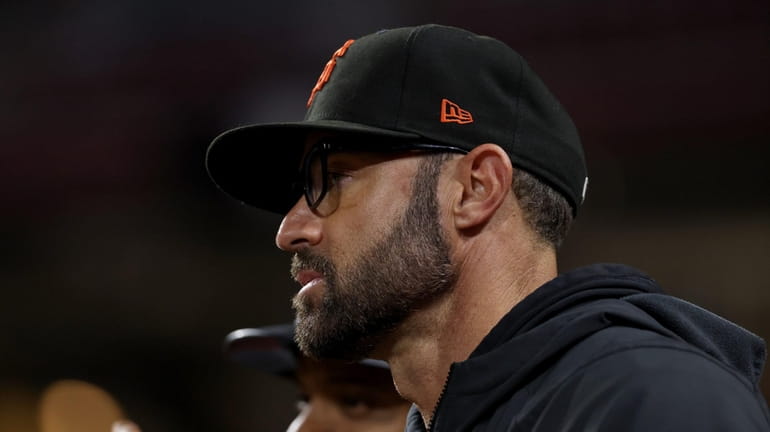A tip of the cap to Gabe Kapler for caring after Uvalde tragedy

Manager Gabe Kapler of the San Francisco Giants looks on in the seventh inning against the Cincinnati Reds at Great American Ball Park on May 27, 2022 in Cincinnati, Ohio. Credit: Getty Images/Dylan Buell
Gabe Kapler’s words, at the very least, let people know they aren’t alone living in anguished frustration.
With an entire nation struggling to process the unfathomable horror of 19 fourth-graders and two teachers being gunned down by an 18-year-old in Uvalde, Texas, the Giants' manager first used a personal blog post to detail his turbulent feelings, then told reporters Friday of his decision to stay inside for the pregame playing of the national anthem “until I feel better about the direction of our country.”
Kapler is no different from any of us in trying to cope with a tragedy that should be beyond the reaches of our worst imagination — aside from the fact that the same unspeakable act happened a decade earlier in Sandy Hook, Connecticut. Or when you realize that Uvalde represented the 27th school shooting this year and we’re not even halfway through the 2022 calendar.
For Kapler, whose blog (kaplifestyle.com) typically features fitness and nutrition posts, he chose to use that medium as a megaphone only a few days after another Bay Area coach — Golden State's Steve Kerr — blasted U.S. senators and gave an impassioned plea for gun reform.
Kapler and Kerr aren’t policy-makers. For some, the initial reaction to their words might be “stick to sports.” But when it comes to the slaughter of children in a classroom, orchestrated by a teenager brandishing an assault rifle, it no longer is a political issue. It’s a humanitarian crisis.
And while Kapler has been an attention magnet for other reasons, this particular stand took courage, even if the cause seems obvious. Taking our country to task for failing the children of Uvalde, or Sandy Hook, or the countless other victims of mass shootings, always gets muddied in the political quagmire of Second Amendment rights vs. common-sense gun control. But Kapler was right to challenge what we actually stand for as a country if we can allow our own children to be murdered by the dozens in what should be a preventable catastrophe.
“When I was the same age as the children in Uvalde, my father taught me to stand for the pledge of allegiance when I believed my country was representing its people well or to protest and stay seated when it wasn’t,” Kapler wrote. “I don’t believe it is representing us well right now.”
Kapler went on to question the inaction of the police at the school — based on reports that their delay in confronting the shooter cost more children their lives — and politicians’ ties to the NRA and other pro-gun lobbyists. One passage in which Kapler did raise a different vantage point, however, involved these repeated moments of silence, as well as the daily playing of the national anthem that follows.
After a while, when these tragedies pile up, it becomes impossible to just go through the motions on a daily basis. If there truly is meaning to these gestures in honoring the victims and living the pledge of “The Star-Spangled Banner,” wouldn’t it make sense to actively attempt to do so rather than shrug everything off until the next one?
“I’m often struck before our games by the lack of delivery of the promise of what our national anthem represents,” Kapler said. “We stand in honor of a country where we elect representatives to serve us, to thoughtfully consider and enact legislation that protects the interests of all the people in this country and to move this country forward towards the vision of the 'shining city on the hill.' But instead, we thoughtlessly link our moment of silence and grief with the equally thoughtless display of celebration for a country that refuses to take up the concept of controlling the sale of weapons used nearly exclusively for the mass slaughter of human beings.”
Kapler’s view of this practice mirrors to some degree Colin Kaepernick’s 2016 anthem protest, except that he took a knee to bring attention to racial inequality and police brutality. Kaepernick did achieve a measure of success in those goals, but his practice also was twisted into an anti-American stance or disrespect for the armed forces — even though he consulted with a retired Army Green Beret, fellow player Nate Boyer, in an effort to avoid that perception. He never played another NFL game after that season ended amid suspicion that he was blackballed for his protest.
As for the potential fallout for Kapler, that remains to be seen. There are sure to be those who label him as unpatriotic for this decision to stay inside for the anthem, especially coming so close to Memorial Day. But as Kapler stated, he believes the exact opposite should be true — what is more patriotic than working to make your country a better place? Or even trying to raise awareness toward those efforts?
"I don't expect it to move the needle necessarily," Kapler told reporters Friday in Cincinnati. “It's just something that I feel strongly enough about to take that step.”
On the clock
When the Yankees called up JP Sears for Wednesday's spot start against the Orioles, there were a number of quick adjustments for the lefty from Triple-A Scranton/Wilkes-Barre. One of the toughest? Slowing down, he said, as Sears usually is subject to the 14-second pitch clock currently deployed in the minors.
Sears, making his first major-league start, didn’t mind the less hurried tempo. He pitched five scoreless innings in the Yankees’ 2-0 victory. But MLB is thrilled with what the pitch clock has done to the pace of play in the minors as the time of game continues to shrink, with commissioner Rob Manfred checking up on the progress during a visit to the Class A Tampa Tarpons this past week
As of Friday, through 1,1315 games with the pitch clock, the average length is down to 2:35 — shaving another four minutes from the time recorded five weeks earlier. By comparison, in 5,539 games without a clock last season, the average length of a nine-inning minor-league game was 3:03. This season in the majors, the average duration is 3:05 through 677 games, down from 3:10 a year ago.
Numbers game
MLB has the right idea in shrinking the number of pitchers on the 26-man roster, and originally planned to reduce that to 13 by Monday. But this week brought another extension — it now won’t take effect until June 19 — simply because of the physical toll on staffs already this season. The condensed spring training (because of labor issues) probably is a big factor.
Through Friday’s games, teams had a total of 223 players on the injured list, and 148 were pitchers. The Yankees alone lost four in the span of four days, including two to Tommy John surgery in Chad Green and Luis Gil. The physical strain seemingly is only going to increase once staffs are trimmed to 13, presumably with starters having to pitch deeper into games, so it will be interesting to see how clubs cope with the change.

